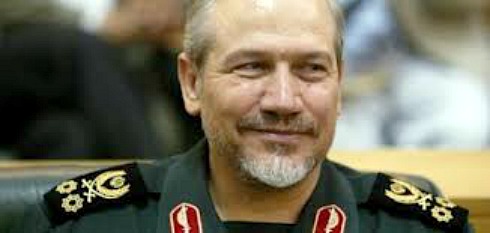Archives
AND MORE...

We Lied
_____________________

Another Day in Centrifuge-Land
_____________________

Death, Deceit & Dishonor
_____________________

Kick Me
_____________________
November 12, 2012
Weak & Confused
Weak and confused are two words being used today by Iran’s Revolutionary Guards to describe America after Iranian warplanes fired on an American drone last week, and after Iran turned down another U.S. request to set up a direct hotline between the two countries' military forces in order to avoid unwanted confrontations in the Persian Gulf (see below).
Add to that last week’s report about White House Senior Advisor Valerie Jarrett (of all people) conducting secret talks with Iran, and once again we see America acting without regard to how its enemies will perceive it.
Is it any wonder Iranian military analysts think the Islamic republic has the capability to win an "asymmetrical war" against the US? After carefully observing America's actions/inactions in the Middle East, the Iranians have come to believe they can outsmart and outmaneuver the US, despite US military superiority.
WND | November 12, 2012
Iran Rejects U.S. Hotline Request
'This drone shooting was a warning to America'
By Reza Kahlili

After its warplanes fired on an American drone last week, Iran has not only turned down a U.S. request for a direct, diplomatic hotline, but has also suggested America’s “cautious” response is a sign of its weakness in the Middle East.
Reports on Nov. 8, which were confirmed by the Pentagon, said that two Revolutionary Guards fighters shot at a U.S. drone in international airspace, east of Kuwait.
“The U.S. had requested Iran set up a direct hotline, and Iran rejected the request,” Maj. Gen. Yahya Rahim Safavi, a senior military aide to the supreme leader, said Sunday, according to Fars News Agency, a media outlet run by the Revolutionary Guards.
Guard commanders did not announce the shooting, which took place before the U.S. presidential elections, and only confirmed the incident after it was revealed in the U.S. days ago.
Safavi did not clarify when the U.S. request for the hotline was made, but his announcing it Sunday most likely linked it to the recent shooting.
U.S. defense officials had also made such a request in 2011 after a series of close encounters between U.S. and Guard naval vessels in the Persian Gulf. That request was also turned down by the Islamic regime.
“We would establish direct contact with the United States if we would ever go to the Gulf of Mexico,” the Guards’ naval commander, Ali Fadavi, stated then. He has previously announced Guard plans for sending warships into the Atlantic Ocean, close to the Gulf of Mexico.
“This (drone) shooting was a warning to America,” Brig. Gen.Amir Ali Hajizadeh, commander of the Guards aerospace division, added Sunday.
“We will not undercut the defense of our national security, and if in the future the enemy crosses our red line and repeats this incident, we will respond in harsher measures,” he told Sepah news, the official site of the Revolutionary Guards.
Hajizadeh also promised more information on a previously captured U.S. stealth drone, an RQ170.
A more ominous warning out of the Islamic republic came in an analysis of the incident posted on Irannuc.ir, a regime media outlet reflecting Iran’s official views on its nuclear program and its strategy in confronting America and Israel.
The analysis, posted Sunday, said the latest drone incident has caused confusion among the U.S. defense and intelligence communities. This unexpected and successful action in turning away the drone close to Iran has three important messages that the West has yet to understand, it said.
First, this incident demonstrates that the Islamic republic has not counted out a military confrontation with America, the opposite of what the American leadership believes – that Iran won’t look for a confrontation and actually is avoiding such, and its rhetoric is a bluff. According to Iranian military analysts, however, this incident shows that the Islamic republic has the capability to win an asymmetrical war against the U.S. using its own tactics and military capabilities despite U.S. military superiority.
Second, America reacted to the incident cautiously, not militarily, diplomatically or even publicly, in its one public statement. The lack of action in the view of Iranian military analysts means that America is in no way looking for a confrontation with the Islamic republic and in fact has such confrontation as its red line. Therefore, it’s only natural that the Islamic republic is aware of this limited U.S. strategy and will benefit from it.
Lastly, the Islamic republic has decided to respond to U.S. and Israeli actions in Syria and Sudan by showing its capability in confronting the U.S. at its borders, and this, according to its military analysts, will create a tactical deterrence.
Reza Kahlili is a pseudonym for a former CIA operative in Iran’s Revolutionary Guards and author of the award winning book “A Time to Betray” (Simon & Schuster, 2010). He serves on the Task Force on National and Homeland Security and the advisory board of the Foundation for Democracy in Iran (FDI).
Original article here.
Log In »
Notable Quotables
"Mr. Netanyahu is one of the most media-savvy politicians on the planet. On Friday he appeared live via video link on 'Real Time with Bill Maher,' taking the host’s alternately sardonic and serious line of questioning with gazelle-like alacrity."
~ Anthony Grant, jourrnalist who has written for many major newspapers and worked in television at Paris and Tel Aviv, interviewing former PM Benjamin Netanyahu on Monday, at the outset of Mr. Netanyahu's new book (more here).


